In the second Test against the West Indies, played in Multan, Pakistan once again succumbed to a repeated mistake, losing by a massive margin of 120 runs. This defeat not only cost Pakistan the match but also the opportunity to win the series. The team’s recurring errors have now become a worrying trend, turning potential victories into frustrating defeats.
Multan Test: A Missed Opportunity
In the second Test, Pakistan was in a commanding position early on, reducing the West Indies to 54-8 in their first innings. However, the inability to capitalize on this advantage allowed the visitors to recover and post 163 runs. These additional 109 runs proved to be the turning point in the match, ultimately tilting the balance in favor of the West Indies.
Despite having control in the early stages, Pakistan’s bowlers struggled to dismiss the lower-order batters. This recurring issue has been a major factor in the team’s recent defeats, not just in this series but in other matches as well.
A Repeated Pattern of Failure
Pakistan’s inability to finish off the opposition’s lower order has become a habit rather than an isolated mistake. Over the years, this problem has plagued the team in crucial matches, turning winning positions into heartbreaking losses.
South Africa Test Match: Last month, Pakistan lost a Test match against South Africa despite reducing them to 99-8. The tail-enders dominated the Pakistani bowlers, adding vital runs that secured a victory for South Africa.
Bangladesh Series: In a home series last year, Pakistan had the Bangladesh team at 26-6, but the lower order staged a remarkable comeback. This led to Pakistan suffering a humiliating whitewash, their first-ever series defeat against Bangladesh.
Acknowledgment from the Captain
The repeated failures to dismiss tail-enders have not gone unnoticed. Captain Shan Masood admitted in a post-match interview that the team’s bowlers tend to relax during critical moments, allowing the opposition’s lower order to gain momentum. This complacency, combined with poor execution, has made finishing innings a significant challenge for the team.
A Wake-Up Call for Pakistan
The stats paint a worrying picture: the runs scored by the opposition’s tail-enders often outnumber the contributions of Pakistan’s top order. This imbalance not only highlights the inefficiency of the bowling unit but also puts additional pressure on the batting lineup.
The Road Ahead
Pakistan’s inability to adapt and learn from past mistakes is costing them dearly in international cricket. To compete at the highest level, the team must address these recurring issues. Dismissing tail-enders and maintaining focus during key moments are essential to turning these near-victories into actual wins.
With an important calendar of matches ahead, including high-stakes tournaments, Pakistan needs to make tactical and mental adjustments to avoid further embarrassment. The fans, too, are eager for the team to break this cycle of repeated mistakes and rise to their full potential.
Will Pakistan learn from their errors, or will the cycle of missed opportunities continue? Only time will tell.



